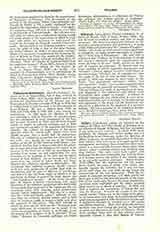

Villeneuve-Barcement, JEAN-PAUL-ALBAN, Vicomte de, b. at Saint-Auban, Var, August 8, 1784; d. at Paris, June 8, 1850. After having taken part in the prefectorial administration of the Empire and the Restoration he became councillor of State in 1828, but in 1830 refused to take the oath to the Government of Louis-Philippe. He was a deputy from 1830 to 1831 and from 1840 to 1848 held a seat among the Legitimists. In 1832 when the Duchess of Berri was planning to land in Provence, he accepted from her the commission of royal commissary in the Var, but he soon returned to Paris and devoted himself chiefly to studies in political economy, and in 1848 was appointed a member of the Academie des Sciences Morales. He realized the importance of the social question when he visited Lille, where there were 32,000 paupers, that is nearly half the population. The idea of combating pauperism was thenceforth in his mind. As a deputy he was one of the foremost authors of the law of 1841 limiting child labor, a law which for the first time in France embodied the principle of legal protection for laborers; he caused to be inserted in the fiscal law of 1847 an amendment dispensing from stamp tax and registration the acts necessary to the marriage of the poor and the legitimation of their children. As an economist he stood apart from the school of Adam Smith and Jean-Baptiste Say, whom he regarded as Materialists. He considered that political economy should concern itself less with production of wealth than with its distribution and the general diffusion of wellbeing; and believed that the State ought to interfere in the regulation of labor to protect the weak against the “new feudalism of patrons”. In his “Livre des affiiges” he depicts a bishop complaining with equal bitterness of the industrial proprietors who think only of increasing their gains and of the legislators who are concerned solely with enacting penal prohibitions against labor organizations. His idea of a salary was the “vital and family salary”, sufficient to sustain both the workman and his family, and he held that the employer ought to receive a profit only after the payment of this salary. The chief writings in which his ideas are set forth are the “Economie politique chretienne, ou recherches sur la nature et les causes du pauperisme en France ei en Europe, et sur les moyens de le soulager et de le prevenir” (Paris, 1834); “Iistoire de l’economie politique, ou etudes historiques, philosophiques et religieuses sur l’economie politique des peuples anciens et modernes” (Paris, 1841); “Le livre des affliges” (Paris, 1841).
GEORGES GOYAU

